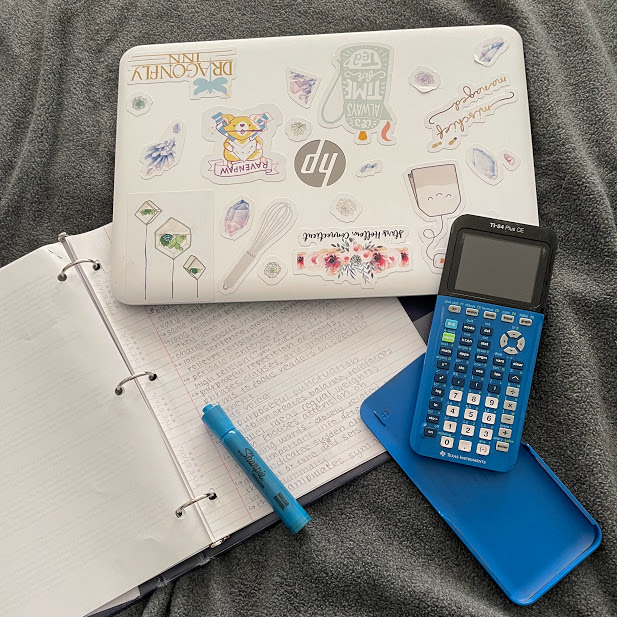How To Survive Your Finals
Supplies are a key part of a good study session. Use highlighters, pens, and other tools to make clear notes and stay organized.
Whether this is your first finals week or you have a few under your belt, after a year of asynchronous learning, you may need a few new study habits. The trick with studying is to find the method that works for you. Not every method is a perfect fit, and each has its own strengths. Below are five study tips that can make the end of the semester a little less stressful.
Advice from a Middleton High School Teacher
MHS Teacher Ms. Stacy Wood, who is teaching Pre-Calc and HiGAP this semester and has previously taught Algebra II and Geometry, has advice for students as they prepare for finals. Her recommendation for any student is to practice by doing homework or any other review materials your teacher gives you.
Doing a variety of different problems is important, but the order of problems is also a key factor, Wood explains.
“I would start with things that you know really well to build up your confidence,” she said. The next step is to use what you know and move on to more challenging problems.
While not all courses have a topics list, Wood recommends the syllabus as a great place to start along with visiting your teacher during ASR. “Doing practice is the best way to know and understand your material,” she said. So how should you practice?
The 20:5 Method
The 20:5 method is my recommended time ratio of study time to break time. There is lots of useful information online on the benefits of this method, also known as the Pomodoro Method. While sitting down and studying for an hour straight may seem productive, it can be more difficult to retain the information you are studying in the middle of such long sessions. Giving yourself five-minute breaks helps avoid boredom and gives your brain a chance to process everything you have reviewed.
There are a variety of different timers available online to help you keep track of your time. Unlike other strategies, the 20:5 is less flexible and best for students who need help staying focused. The method keeps you on a rigid schedule and can be difficult to use if you only have time to study for a half hour. If you are looking for a strategy to organize your material, try one of the methods below.
Quick Review Sheet
This method is my personal favorite because it helps you review the material for the entire semester. Grab a single piece of paper and start going through any notes or unit sheets your teacher has provided throughout the semester. Anytime you find something you forgot or do not understand well, add it to the sheet.
As the test draws closer, keep referring back to the sheet and practicing the information on it. Once the test is a few days away, highlight all of the things you still don’t know on the sheet. Then take a second during class to either clarify what the concepts are with your teacher or to reread the section on this topic in your textbook.
As the exam draws closer, this paper serves as a great reminder to study and is a better alternative than trying to find the concepts in your textbook each time you want to review.
Finally, bring this sheet with you to the finals to review before the test. If you finish your previous exam early, use this time to go over the topics for your next class.
Flashcards
Multiple teachers at Middleton allow you to bring one flashcard with notes and other information to your final. Writing small can be helpful if you need to store a lot of information, but making your notes clear and effective is more important. Remember that this notecard is meant for you. Therefore, it should be focused on the things you think are important. Feel free to use random notes that make sense for you and dedicate the space as you see fit. Trying to fit in every topic from the semester is only going to make the information you need harder to find.
For memory or vocab-heavy courses, flashcards are a great way to practice what you know. If you are looking for a premade set, Quizlet has a lot of great course-based sets available. However, the act of writing things down can help improve memorization, as explained in the article, and remind you of old vocab words you might have forgotten. Make sure to do this at least a week ahead of time so you have a chance to use these flashcards for a couple of days. Cramming at the last minute will make it harder to cover as much material.
Online Resources
Google Classroom and AP Classroom are great resources to check if your teacher uses them. There are usually a variety of practice problems on these sites along with explanations for anything you don’t understand. If neither of these sites is used for your class, ask your teacher what videos or practice sheets they would recommend.
Good luck studying and make sure to plan ahead. Get good sleep the night before your first test, eat breakfast, and relax. Enjoy your winter break and get ready to ace your finals!









